Nowhere Boy. Everywhere Man. In any examination of John Lennon; mainly because of the exalted, now mythological esteem held, there is a real danger of loss of perspective and sliding into idolatry, hero worship and misplaced identification.
The lesson of Lennon is that sometimes, even chronically, it is easier to see what we perceive as reality in the lives of other people than it is to see it in our own. Because of the depth of his insight, and his candid expression of what he learned at each step, Lennon’s life is the rich field, that embraces our inconsistent and variable human nature in a vacillating expression of higher ideals and base instincts; from the garden of Eden to a booby-trapped mine- field. One of the things we see clearly in Lennon’s life is that simply wanting to love is not enough. Desire in itself is incomplete;we cannot love on demand mechanistically. It seems the commandment to love must be preceded by an elusive “something” for love can be acceptably fulfilled, without the adornment of ecstasy. Just before his death, Lennon himself said:

Cole:This is the John Lennon expelled from high school for hopping onto the lap of a nude art-class model. It could be argued that Nowhere Boy is too dark, that this John Lennon is too much of a mope. Where is the John who sang in She Said, She Said, “Oh, no-no, you're wrong, when I was a boy, everything was right.” Well, he existed too. John Lennon was a lot of people.
The hardest thing is facing yourself. It’s easier to shout “Revolution” and “Power to the people” than it is to look at yourself and try to find out what’s real inside you and what isn’t, when you’re pulling the wool over your own eyes. That’s the hardest one. ( Gary Tillery )
…”The movie begins with a bit of musical foreshadowing – John peddling down a street, accompanied by the thrashing opening chord of A Hard Day’s Night. Seconds later, we pass Strawberry Fields and experience a flicker of worry. Who needs a musical survey of Lennon and Paul McCartney’s early years? No one could top their 1967 single: Penny Lane/Strawberry Fields Forever, a hallucinatory, altogether thrilling childhood travelogue. But then pay dirt: Lennon arrives at school, attracting uniformed girls. One, grinning lewdly, asks John to expose himself. He happily obliges. The girls scatter, giggling. What a perfect introduction to the commotion that was John Lennon, an artist who devoted his best years to self-discovery by revealing himself to fans.” ( Stephen Cole )…
Lennon was an extraordinary composite of emotions,both complementary and contradictory. In Tillery’s book “Cynical Idealist” there is a telling anecdote of how Lennon told the students of a university, who were protesting the University’s refusal to turn a vacant lot into a “People’s Park”, that there was no park “worth getting shot for”. Although they had sought his opinion, they rejected it, and in the event, one hundred were injured, one fatally and one blinded. Lennon’s response was equally incisive: the students had been used by an administration which had provoked them into protesting so that it could come down hard on them. It is similar to students turning on Theodor Adorno; once the “gates of perception” are opened there is no telling where they may lead.
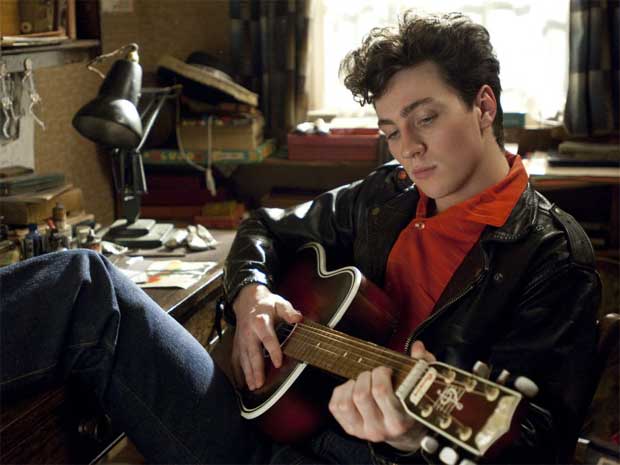
Chris Knight:Most importantly, however, the film treads lightly on the tragedies of the young men. McCartney’s mother had died not long before he met Lennon; so too had Lennon’s uncle and surrogate father, George Smith. And having been taken from Julia and raised by her sister, he was destined to lose his mother more than once. But rather than take the common path of declaring that genius emerges from pain, Nowhere Boy suggests that in every life one can find both. John Lennon merely had a little more of each than most of us. Read more: http://www.nationalpost.com/arts/
Here We Go Again. This song tells something about how we can approach Lennon’s songs. He was the instrument of something which he did not fully understand. While he was clearly central to the process, he also saw it as collective: it is here we go again, and we’ve seen this place before.Something like Nietzsche’s Eternal Recurrence. Is it legitimate to emphasize the first person plural?Lennon accepted Yoko’s ideas of art as something created in the interaction between both artist and audience. Many of her avant-garde pieces needed the audience to progress them: for example, by hammering in a nail as in the famous Indica Gallery piece. ( Azzize)
Lennon often invites us into a sad mystery, a melancholic journey where even a magical mystery tour is lonely and painful. There is a mystery in his work – an irreducible mystery which belongs to us as much as it does to him. And the exploration of it is now our privilege. He may not have been exclusively speaking about music: the mystery is a mystery also of life and existence.
…John loves his mother’s sister, but disappears frequently to find the woman who gave him away, Julia (Anne-Marie Duff) and to ask a simple question: Why? The answer, the film argues, is that Julia wasn’t mature enough to steer a brilliant mess like John. She wanted to be his girlfriend. We see Julia flirt with her son. When she falls into his arms, John doesn’t know what to do with his hands. Julia introduces John to Elvis. Gives him a fake mahogany guitar that he places on his bed, staring at it like it’s a beautiful, naked woman. All of which helps explain why John had an extraordinary musical career and a lifetime of women problems. ( Cole ) …
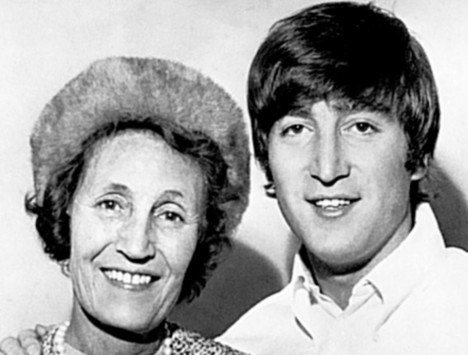
Jo Clements:The movie, which also stars Anne-Marie Duff as Lennon's mother Julia, traces the early days of the singer's rise to stardom in The Quarrymen. Director Sam Taylor-Wood said: 'Mimi was strict and very proper, but she knew how to enjoy a joke, and Julia was the sister who was what today we'd call laid back. 'She was a bit bohemian and didn't take things as seriously as Mimi. 'It's the clash of these two different psychological forces that was
shape the man who would become John Lennon.' Read more: http://www.dailymail.co.ukThough I know we’ve been this place before,
Someone keeps on moving the door.
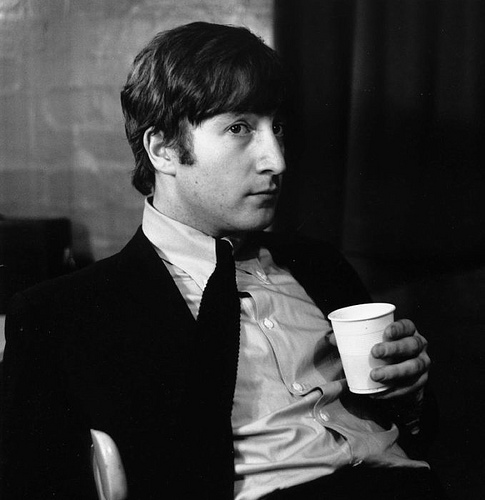
Bev Bevan:One night a couple of The Beatles were there and some local hardcase was giving John Lennon plenty of verbal abuse. Eventually, Lennon had had enough of this and confronted the yobbo, enquiring "Hey mate, does yer mother sew? Well, get her to stitch this!" at which point he administered the 'Liverpool handshake' - a headbutt to the bridge of the bloke's nose!
This is the feeling of being in a situation which does not seem new, and yet, the key of comprehension seems strangely misplaced. It is as if one should know something but that this precious something has been lost; a sense of abandonment, an acceptance and a certain anger at being betrayed. Are these misplaced secrets in the realm of the occult?
So I say hello again,
And nobody gives a damn,
And nobody wants to hold your hand.
Everyone’s an also-ran.
Round and round we go,
Where it’s going, nobody knows.
Though I know we’ve seen this place before,
Someone keeps on moving the door.
There is serious disillusionment here: the statement that everyone is an “also-ran”, is profoundly cynical in one sense, but also ego-deflating in another. After those lines, it is fatalistic to sing “round and round we go, here we go again”. It is a sort of cursing of destiny, though faced with little choice, except to soldier on. Anything positive in the sense of original sense of wonder is put under pressure though not destroyed. “Round and round again” – it has completely assumed the grinding tedium of an aggressive repetition, limited and infinite courses of existence. When one considers the self-pity of this second verse, the line that “someone keeps on moving the door”, takes on a sharper shape: Lennon was indulging somewhat in sorry victimhood.
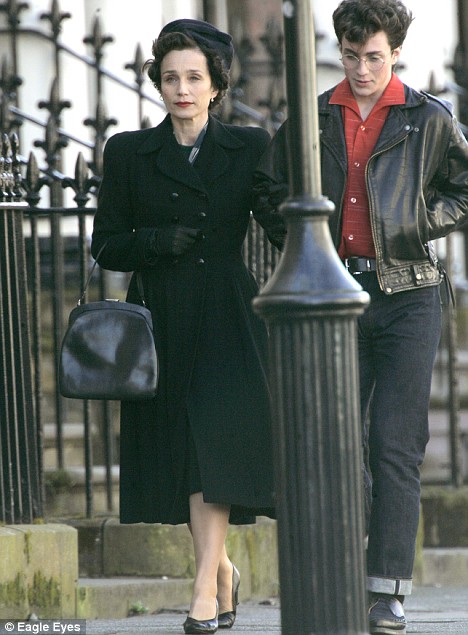
Clements:Looking businesslike in black, and with a dash of red lipstick, this is Kristin Scott Thomas as John Lennon's aunt Mimi. The 48-year-old actress, best known for her roles as upper class ladies in films such as The English Patient, plays the formidable Liverpudlian who famously raised the young Beatle after his mother gave him up when he was five. Miss Scott Thomas is pictured on the set of the film Nowhere Boy in Liverpool with Aaron Johnson, 18, who plays Lennon. Read more: http://www.dailymail.co.uk
In another song, “Look At Me”, Lennon tackles the biggest boulder blocking the road: identity; “Here I am, but who am I?” Nobody, he says, can know but himself and the one who loves him. But then he seems to remove even this hope, by asking “Who are we?”The song after “Look At Me”, the penultimate song on this album, is “God”. Here, as we saw, Lennon disavows his heroes, both personal and social: he will believe not in them but in “me, Yoko and me, and that’s reality”. The sense of multiple realities and ambiguously subjective perceptions of them is the human condition and simply appears unresolvable in desiring the whole answer.
When one considers these songs together, as I think they have to be, what is Lennon’s answer to the emotional desolation and the pain? Is it love? Is it specifically, his love with Yoko? Lennon is aiming at more than that. He never achieved it in his life, but he was reaching for it,and cut down as he was, the cusp of that point is the deity of hope and promise. That message: the first thing is to understand and acknowledge where you are. That is why he opens side two of the album with “Remember”. The music is a relentless advance of drums, bass and piano, with the simplest of melodies, as Lennon pounds this concise message: remember how many lies and fantasies you have fallen for, and remember today.
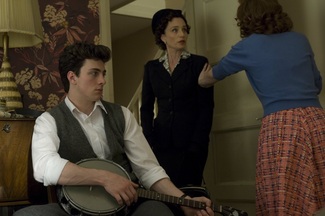
The film gave me the impression that Julia might have been manic-depressive. That's something we didn’t want to push too hard on, because obviously it was nothing that was strictly diagnosed or talked about.
Instant karma’s gonna get you,
Gonna knock you right off your feet
Better recognize your brothers,
Everyone you meet.
Why in the world are we here?
Surely not to live in pain and fear.
Why on earth are you there,
When you’re everywhere?
Come and get your share.
“I’m only beginning to understand what this record was about”, said Lennon in 1972, more than two years after it had been released. I am sure that Lennon could have said the same thing in 1980, the last year of his life. “Instant Karma!” is, I feel, a song so large that it is difficult to take it in. I mean this the way that sometimes, by grace, one has a moment where one is struck with the reality of something: an animal, a person, the sky, the clouds, the wind, a reflection, or a street sign. Buddhists have referred to these illuminations as seeing the “suchness” of reality. It is a big thing when one can sense the “suchness” of one’s own reality, because to the extent that I can, I am able at will to sense myself in relation to other realities.( Aziz)

Mimi, too, was such a complicated woman—both loving and stern. One thing Yoko said to me right at the beginning, the first letter she sent me, was that often Aunt Mimi has been demonized because of the relationship between her and John’s mother. And she said, "You have to remember that she really loved John and believed she was doing right by him. And John really loved her and spoke to her every week of his life." So that relationship was powerful, which is not to say it wasn't a complicated and fiery one.
Such experiences need to be borne, meaning that they involve both “birth” and “bearing”: it is as if a new man is coming to birth, and an inner health or strength is needed to be able to bear the vision. When, in time, such moments have brought some quality of soul to birth, they can be supported for a longer period, so that the soul can do more than blink in the sunlight for a moment or two. The greediness for more is the danger of being “blinded by the light” , and a lack of satisfaction and gratefulness in “even this we are thankful for”.
Well, we all shine on,
Like the moon and the stars and the sun.
Yeah, we all shine on,
On and on and on, on and on.
Well, we all shine on,
Like the moon and the stars and the sun.
Like the moon and the stars and the sun.
Yeah, we all shine on,
Like the moon and the stars and the sun.
Yeah, we all shine on …
Mentioning Imagine, one cannot help but be struck by the directness of Lennon’s insights into our predicament and what we can do: “imagine” and “remember”. These are two simple, gentle, internal acts. Lennon was only ever at best in two minds about political revolution, although he was pragmatic enough to see the point in exerting pressure at key points. He was deep enough to see that the profound issues must be addressed first within, by such efforts as acknowledging reality, and then imagining that it could be different.
Lennon saw that without love our hold our on reality is flimsy: and he saw that this was true of himself. If he had been without love or any genuine experience of reality, he could not have understood this. But this does not mean that his insight was one he lived each moment of his day. It was an ideal the truth of which he had comprehended at some level, even if the truth did not possess him so as to suffuse him.
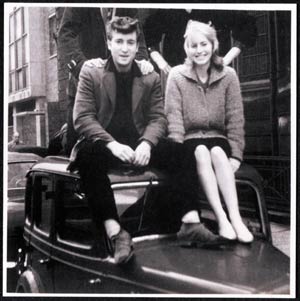
I think poor casting let this film down. Julia & Mimi were cast perfectly but the young Beatles were not at all!... especially the bizarre casting of Thomas Sangster as a young Paul McCartney."
Now to return to remorse. Lennon’s sentiments are fairly compelling: we can destroy ourselves through guilt. Guilt is identification with our faults and mistakes. It is not a way forward. Guilt only adds new problems and damages us further. But what is the substitute? impartiality as a yellow brick road that will bring us to remorse…. The difficulty is not to rush into remorse so forcefully that we crash over into guilt. If I am impartial, I see myself as I am and have been, I also see what I did, and that, in those circumstances, with what I understood, what I felt and the resources available to me, I could have done and been no different.(Aziz)
Another Lennon enigma is the concept of understanding bringing a responsibility with it. A responsibility and not a burdens to be dragged like a sack of woe. Is the greatest reward one can be given the reward of a serious responsibility? Lennon seemed to be moving in this direction; the recording stopped for him at this juncture. Like Moses he brought us to a certain promised land, but could not enter it. Are we up to the challenge?





 COMMENTS
COMMENTS